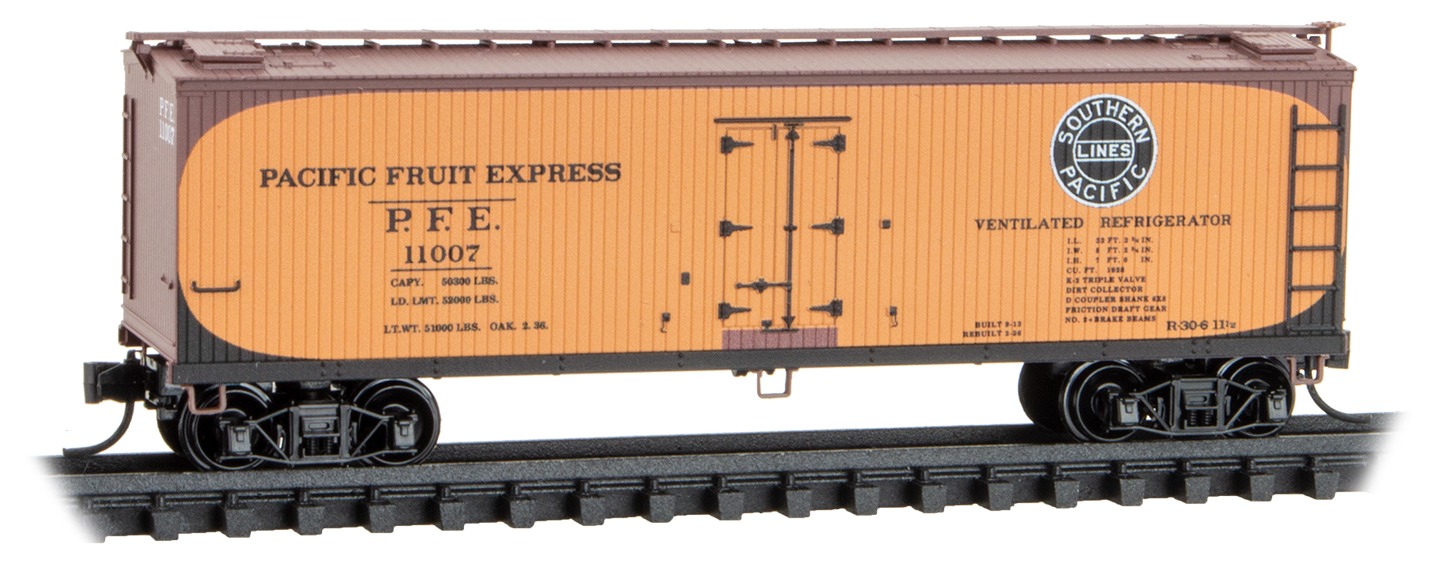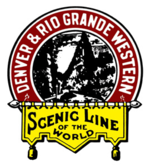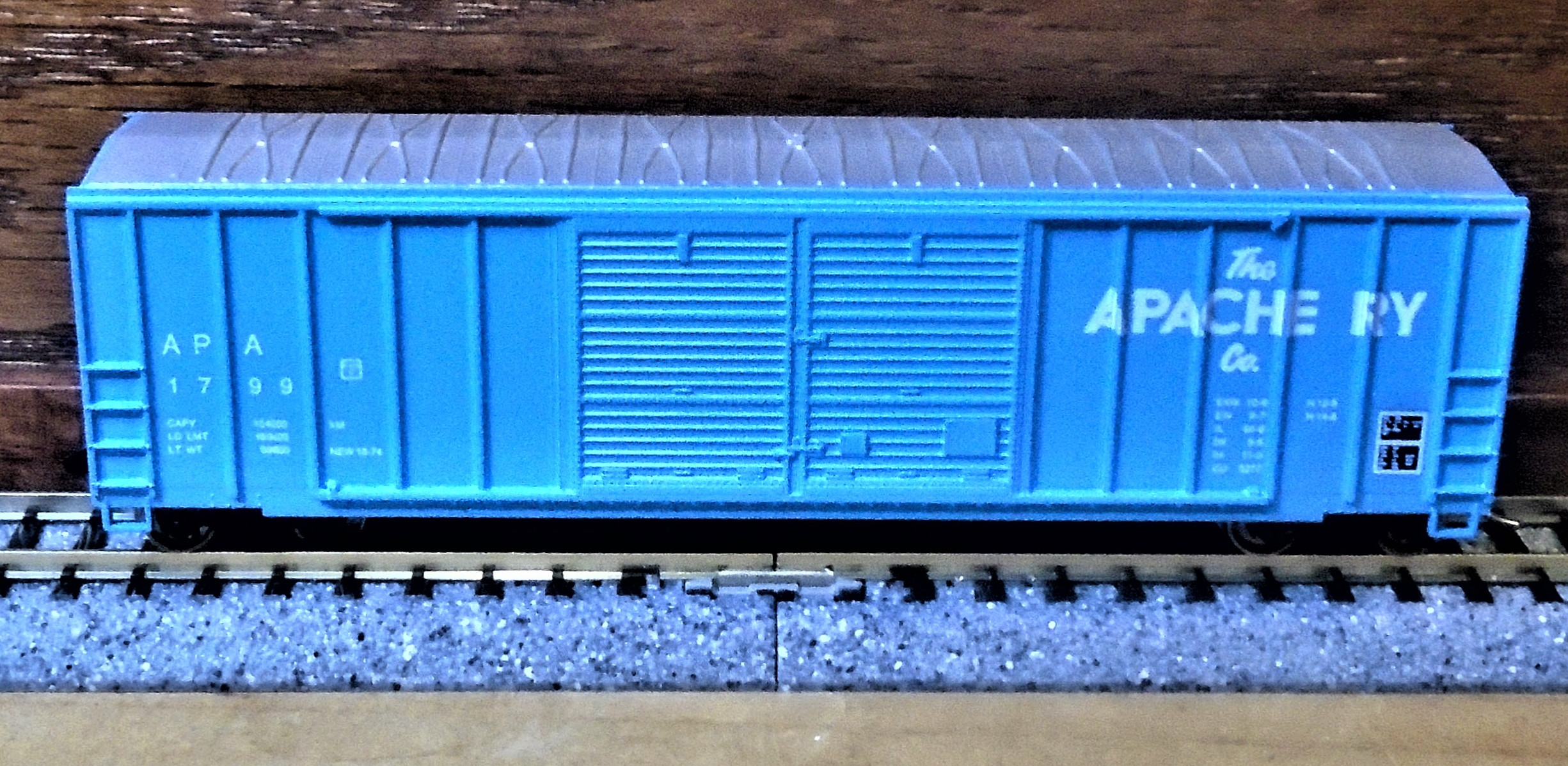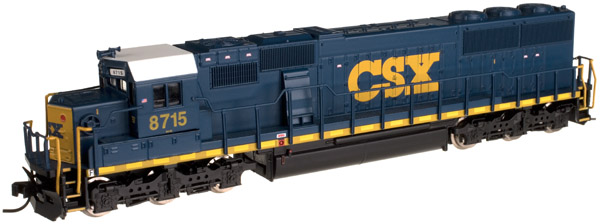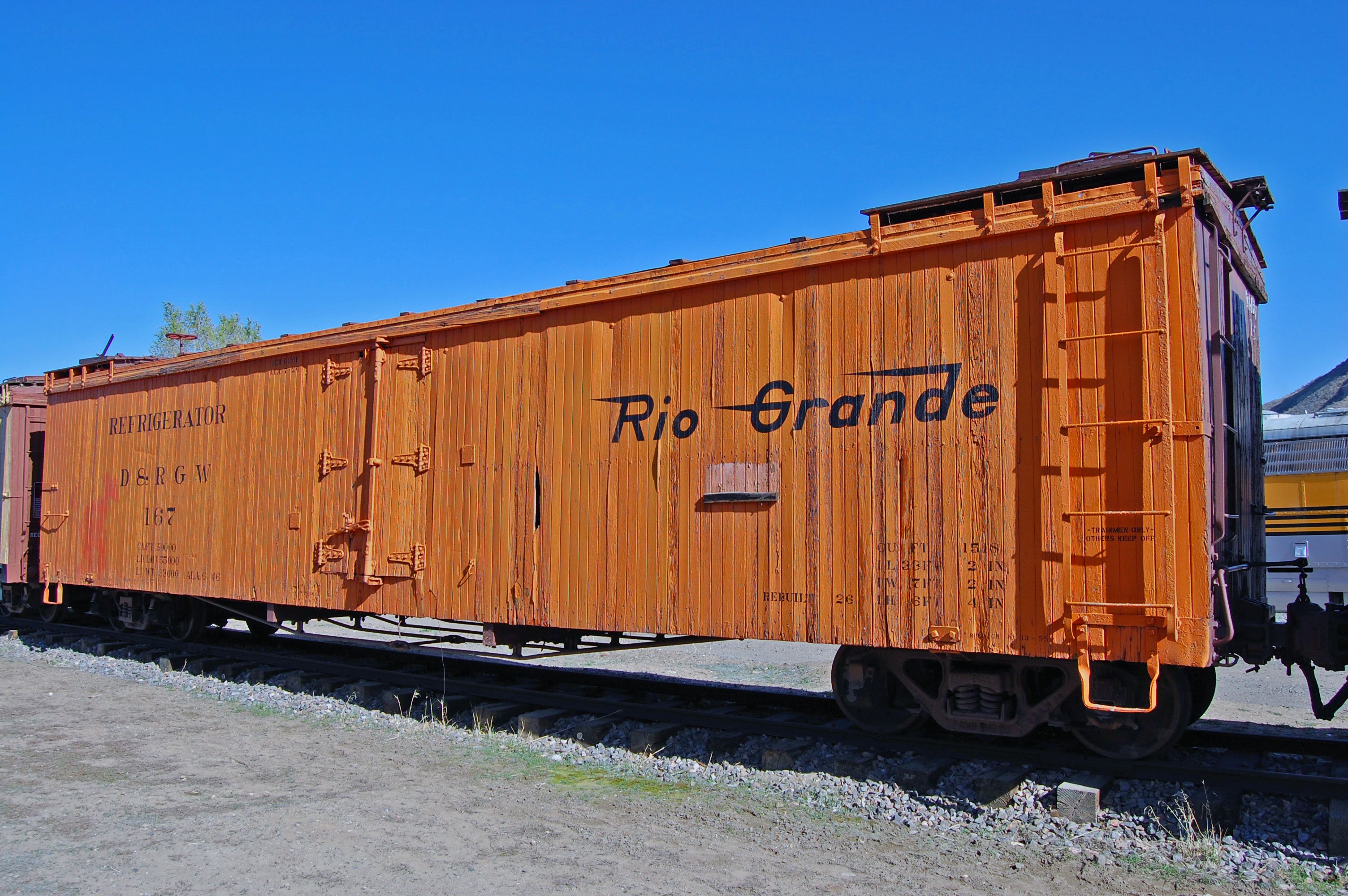Micro-Trains - 049 00 961 - Reefer, Ice, 40 Foot, Wood - Pacific Fruit Express - 11007
Click to see the details
market
| Stock Number | 049 00 961 |
| Secondary Stock Number | 04900961 |
| Original Retail Price | $28.95 |
| Brand | Micro-Trains |
| Manufacturer | Micro-Trains Line |
| Body Style | Micro-Trains 049 Reefer Wood 40 Foot Vertical Brake |
| Image Provider's Website | Link |
| Prototype Vehicle | Reefer, Ice, 40 Foot, Wood (Details) |
| Road or Company Name | Pacific Fruit Express (Details) |
| Reporting Marks | PFE |
| Road or Reporting Number | 11007 |
| Paint Color(s) | Box Car Red w/ Orange Side |
| Print Color(s) | White, Black and White |
| Additional Markings/Slogan | Southern Pacific Ventilated Refrigerator |
| Coupler Type | MT Magne-Matic Knuckle |
| Coupler Mount | Truck-Mount |
| Wheel Type | Injection Molded Plastic |
| Release Date | 2023-11-01 |
| Item Category | Rolling Stock (Freight) |
| Model Type | Reefer |
| Model Subtype | 40 Foot |
| Model Variety | Wood Sheathed, Vertical Brake Wheel |
| Prototype Region | North America |
| Prototype Era | NA Era II: Late Steam (1901 - 1938) |
| Years Produced | 1924-1926 |
| Scale | 1/160 |
| Track Gauge | N standard |
Specific Item Information:
These Pacific Fruit Express ice reefer with Archbar trucks were built in 1913. They were later rebuilt as an R-30-6, and featured the “curved corner” scheme first used in 1936. Pacific Fruit Express, a joint venture between Union Pacific and Southern Pacific, was founded in 1906 and continued jointly until 1978 when the assets were divided between the two railroads
Model Information:
Micro-Trains introduced this body style in July of 1982. It features opening roof hatches - an innovation for N Scale at the time. The detail of the body combined with the high quality printing makes this tooling an excellent choice for modeling early-20th century billboard reefers. It is particularly well suited for modeling the cars used by pre-war meat packers. The prototype is a 40 Foot Wood-Sheathed Ice Reefer with vertical brake wheel (the wheel itself is horizontal).
Prototype History:
In 1924 and 1926, the D&RGW shops in Alamosa built one last class of refrigerator cars, still made mostly of wood: twenty "long" reefers, with a length of 40ft and a capacity of 25 tons (#150 to 169). They rode on Andrews trucks and were designed to have the same capacity as a small standard gauge refrigerator car, to facilitate transhipments at the gauge changing points. In 1967, 12 of these refrigerator cars were still active on the Rio Grande. Today, four long reefers are conserved on the Cumbres & Toltec Scenic Railroad (#157, 163, 166 and 169), two at the Colorado Railroad Museum (#159 and 167), one on the Georgetown Loop Railroad (#153) and #168 is part of the Sumpter Valley Railway collection.
Road Name History:
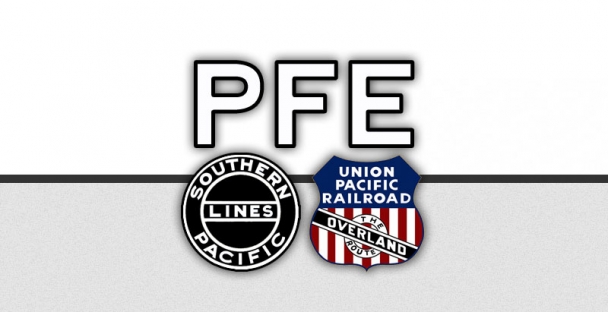 Pacific Fruit Express (reporting mark PFE) was an American railroad refrigerator car leasing company that at one point was the largest refrigerator car operator in the world. The company was founded on December 7, 1906 as a joint venture between the Union Pacific and Southern Pacific railroads. It began operation on October 1, 1907, with a fleet of 6,600 refrigerator cars built by the American Car and Foundry Company (ACF).
Pacific Fruit Express (reporting mark PFE) was an American railroad refrigerator car leasing company that at one point was the largest refrigerator car operator in the world. The company was founded on December 7, 1906 as a joint venture between the Union Pacific and Southern Pacific railroads. It began operation on October 1, 1907, with a fleet of 6,600 refrigerator cars built by the American Car and Foundry Company (ACF).
In 1923, the Western Pacific Railroad joined the venture by leasing its own, brand new fleet of 2775 reefers to PFE. They were painted in standard PFE colors with only WP heralds on the cars instead of the paired UP-SP markings. The WP cars were all retired by the late 1950s, among the last wooden reefers in PFE's fleet. WP ended its partnership with PFE in late 1967 and joined Fruit Growers Express instead.
PFE's assets were divided between the UP and SP when the company was split on April 1, 1978. It is now a UP subsidiary.

In 1923, the Western Pacific Railroad joined the venture by leasing its own, brand new fleet of 2775 reefers to PFE. They were painted in standard PFE colors with only WP heralds on the cars instead of the paired UP-SP markings. The WP cars were all retired by the late 1950s, among the last wooden reefers in PFE's fleet. WP ended its partnership with PFE in late 1967 and joined Fruit Growers Express instead.
PFE's assets were divided between the UP and SP when the company was split on April 1, 1978. It is now a UP subsidiary.
Brand/Importer Information:
Micro-Trains is the brand name used by both Kadee Quality Products and Micro-Trains Line. For a history of the relationship between the brand and the two companies, please consult our Micro-Trains Collector's Guide.
Manufacturer Information:
 Micro-Trains Line split off from Kadee Quality Products in 1990. Kadee Quality Products originally got involved in N-Scale by producing a scaled-down version of their successful HO Magne-Matic knuckle coupler system. This coupler was superior to the ubiquitous 'Rapido' style coupler due to two primary factors: superior realistic appearance and the ability to automatically uncouple when stopped over a magnet embedded in a section of track. The success of these couplers in N-Scale quickly translated to the production of trucks, wheels and in 1972 a release of ready-to-run box cars.
Micro-Trains Line split off from Kadee Quality Products in 1990. Kadee Quality Products originally got involved in N-Scale by producing a scaled-down version of their successful HO Magne-Matic knuckle coupler system. This coupler was superior to the ubiquitous 'Rapido' style coupler due to two primary factors: superior realistic appearance and the ability to automatically uncouple when stopped over a magnet embedded in a section of track. The success of these couplers in N-Scale quickly translated to the production of trucks, wheels and in 1972 a release of ready-to-run box cars.
Micro-Trains Line Co. split off from Kadee in 1990 to form a completely independent company. For this reason, products from this company can appear with labels from both enterprises. Due to the nature of production idiosyncrasies and various random factors, the rolling stock from Micro-Trains can have all sorts of interesting variations in both their packaging as well as the products themselves. When acquiring an MTL product it is very important to understand these important production variations that can greatly enhance (or decrease) the value of your purchase.
Please consult our Micro-Trains Collector's Guide

Micro-Trains Line Co. split off from Kadee in 1990 to form a completely independent company. For this reason, products from this company can appear with labels from both enterprises. Due to the nature of production idiosyncrasies and various random factors, the rolling stock from Micro-Trains can have all sorts of interesting variations in both their packaging as well as the products themselves. When acquiring an MTL product it is very important to understand these important production variations that can greatly enhance (or decrease) the value of your purchase.
Please consult our Micro-Trains Collector's Guide
Item created by: CMK
on 2023-10-30 13:20:43
Last edited by: CMK on 2023-10-30 13:20:44
If you see errors or missing data in this entry, please feel free to log in and edit it. Anyone with a Gmail account can log in instantly.
Last edited by: CMK on 2023-10-30 13:20:44
If you see errors or missing data in this entry, please feel free to log in and edit it. Anyone with a Gmail account can log in instantly.


